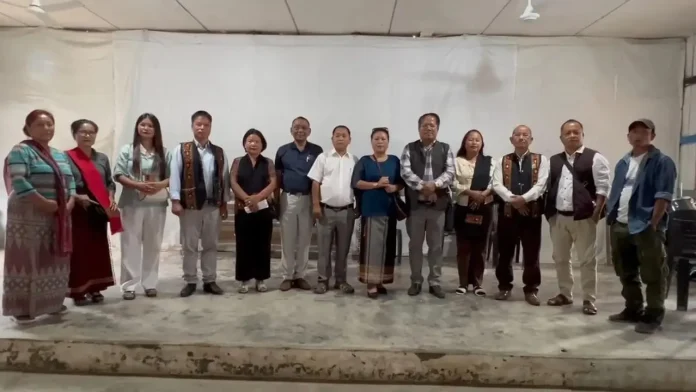KANGPOKPI, April 11: The peace dialogue between the Centre and Manipur’s ethnic communities suffered a significant setback as Kuki-Zo leaders on April 10 publicly rejected the Central Government’s six-point proposal presented during high-level talks held in New Delhi on April 5. The decision was announced during a grand public reception in Kangpokpi, where returning delegates were received with overwhelming support and emotional fanfare by the Kuki-Zo community.
Organized by the Committee on Tribal Unity (CoTU), the event brought together tribal leaders, representatives of Kuki Inpi Sadar Hills, Thadou Inpi, student unions, and women’s groups at the KBC Hall in Kangpokpi. The delegates briefed the community on the Delhi talks, underlining their unified refusal to sign any agreement under the present terms.
“We did not come home with an agreement, but with a firm message—that we will not trade our people’s future for a rushed settlement,” a Kuki-Zo leader declared.
The six-point proposal presented by the Government called for a cessation of community-targeted violence, return and rehabilitation of internally displaced persons, restoration of highway movement, disarmament cooperation, prioritization of development in neglected areas, and continued dialogue through the Ministry of Home Affairs (MHA).
However, Kuki-Zo Council (KZC) Chairman Henlianthang Thanglet, speaking at both the reception and a follow-up press conference, said the proposal failed on two major fronts: it lacked provisions that adequately safeguard the future and political aspirations of the Kuki-Zo people, and it involved Meitei civil society organizations—namely AMUCO and FOCS—that, he asserted, do not hold legitimate mandates to represent their community.
“The Government made a strategic misstep by pushing for a joint dialogue without first consulting the communities separately. This premature interaction reopened emotional wounds and prevented any meaningful progress,” Thanglet said.
He further clarified that the idea for a cessation of hostilities had originated from the Kuki-Zo Council itself, and that the Delhi talks were a response to that initiative. Despite that, the lack of structured follow-up and vague indications regarding the next round of consultations left the community disappointed and concerned.
While Meitei leaders have expressed general support for the six-point plan, the Kuki-Zo rejection underscores the complexity and tension that continue to plague Manipur’s ethnic peace process. The joint talks involved six Meitei representatives from AMUCO and FOCS, and eight delegates from the Kuki-Zo Council and Zomi Council, in the presence of senior officials including MHA Advisor A.K. Mishra, Joint Director Rajesh Kamble, Chief Secretary Prashant Kumar Singh, and ADGP Ashutosh Kumar Sinha.
Kuki-Zo leaders are now urging the MHA to change course by conducting separate, structured consultations with mandated representatives from each community before any future joint sessions are attempted.

